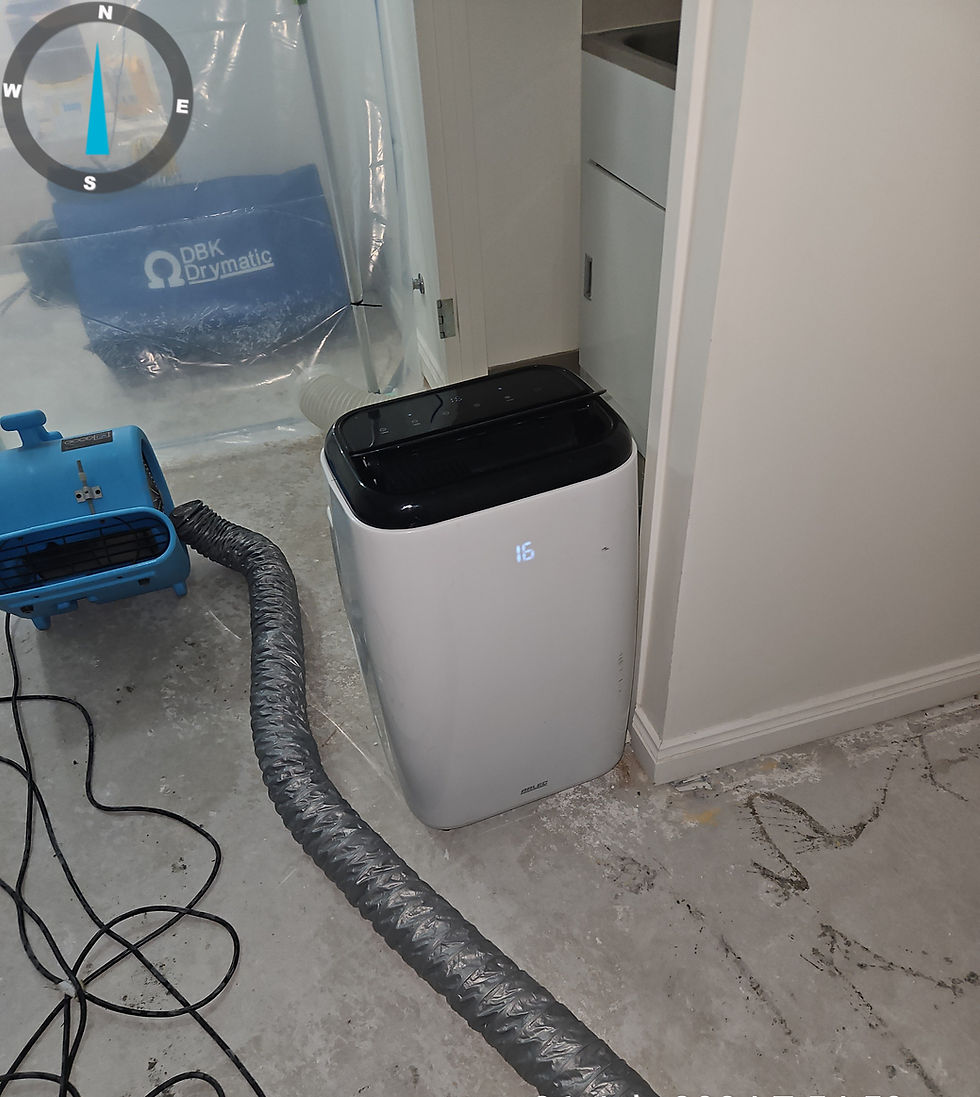Roof Mould Remediation in Lindfield After Storm Damage – Ceiling Cavity Mould Removal Full from Start to Finish
- Michael Nguyen
- Jul 10, 2025
- 4 min read
When a severe storm swept through Lindfield, a local homeowner was left dealing with the aftermath of water intrusion through damaged roof tiles. The resulting of water damage created the perfect environment for roof cavity mould growth, which posed both a health risk and a structural concern. Our team at AAA Mould Removal was called in to perform a complete mould remediation and water damage restoration service, handling everything from cleaning to insulation replacement and even roofing support.
🌧️ What Caused the Roof Mould?
Roof tiles were displaced during the storm, allowing rainwater to penetrate the ceiling cavity. The water-saturated insulation and roof trusses created ideal conditions for mould to flourish undetected. By the time we inspected the roof space, large areas were visibly contaminated and others required deeper moisture detection and treatment.
🧰 Our Ceiling cavity mould removal Process
This 8-day project ceiling cavity mould removal, valued at $7,000, involved multiple steps and advanced remediation techniques:
1. Initial Inspection and Planning
Comprehensive mould inspection using moisture meters and visual checks
Assessment documented via our Clean Claims CRM system to support insurance
2. Insurance Claim Support
We worked directly with the client’s insurance company and loss adjuster, streamlining the claims process. Our reports and records ensured that the homeowner received proper coverage for the mould remediation and repairs.
3. Insulation Removal and Source Control
Removed all existing insulation to expose mould-affected surfaces
Contained the work area to prevent cross-contamination
4. Professional Roof Mould Cleaning
HEPA sandwich vacuuming of roof cavity to remove spores and debris
Damp wiping and chemical washing of trusses and structural timber. Especially in areas near butt joints that shows visible mould growth
Abrasive sanding and targeted media blasting for deeply embedded mould on timber frames and trusses
5. Structural Drying
Deployed air movers and LGR dehumidifiers to flash-dry the areas before and after chemical treatment
Drying prevented re-growth and ensured proper surface cure
6. Encapsulation with IAQ 6000
In areas where physical source removal wasn’t possible, we applied Fiberlock IAQ 6000 – a mould-resistant coating that seals and protects treated timber.
7. Roof Repair Coordination
We helped the client connect with a qualified roofer and coordinated repairs while remediation was underway — saving time and preventing further leaks.
8. Insulation Replacement
After all remediation and drying were complete, we re-installed new ceiling insulation to restore thermal efficiency and meet current energy standards.
Photo/Video Gallery From this Project


✅ Project Outcome
Roof cavity fully remediated and mould-free
New insulation installed
Roof leak repaired during the project
Full insurance support using Clean Claims CRM
8-day turnaround for complete restoration
🛠️ Need Professional Roof Mould Removal in Sydney?
Storms and hidden roof leaks can quickly lead to mould infestations that put your health and property at risk. If you’ve noticed musty odours or suspect roof cavity mould, don’t wait. Book a professional mould inspection today with AAA Mould Removal.
📌 Related Services:
❓ Frequently Asked Questions (FAQ)
Does mould in the roof cavity affect indoor air quality?
Yes. Mould spores from the roof cavity can circulate through ceiling gaps and vents, potentially causing respiratory symptoms and allergic reactions. Early removal is essential to protect your indoor air quality.
Will my insurance cover mould removal?
In many cases, yes — especially when the mould is a result of sudden storm damage or water ingress. We help clients deal directly with insurers and loss adjusters, and we use Clean Claims CRM to ensure accurate documentation for claims.
How long does roof mould remediation take?
This project took 8 days, but duration varies depending on the severity of contamination, drying time, and whether repairs (e.g., roof leaks) are involved.
What is IAQ 6000 and why do you use it?
IAQ 6000 is a mould-resistant encapsulating sealant used when contaminated surfaces can’t be physically removed. It seals in residual spores and prevents future mould growth on cleaned areas.
Will you replace my insulation after mould removal?
Absolutely. We removed and disposed of all contaminated insulation and installed brand-new insulation once remediation and drying were completed.
📞 Get in Touch
Contact AAA Mould Removal today for reliable, insured, and IICRC-certified mould remediation in Sydney.
About the Author
Michael Nguyen is the founder of AAA Mould Removal and a leading expert in mould remediation and building science. His mission is to help Sydney residents maintain healthy indoor environments through scientifically-backed, professional remediation services.
With a unique combination of hands-on and academic expertise, Michael's qualifications are extensive:
IICRC Certified: Water Damage Restoration, Applied Microbial Remediation & Applied Structural Drying.
Microbiology: Completed specialised study in Microbiology at RMIT University.
Licensed Builder & Carpenter with a Diploma in Building & Construction.
Current University Studies: Double Bachelor’s degree in Medical Science and Environmental Science at Macquarie University.
This deep understanding of building structures, environmental science, and microbiology allows Michael to diagnose the root cause of mould problems, not just treat the symptoms. He specialises in residential and commercial mould removal, black mould treatment, and water damage restoration.
Need a true expert to assess your property? Contact AAA Mould Removal today for a comprehensive inspection.
.png)

Comments